#being a philosophy major is just an exercise in self torture at the end of the day
Explore tagged Tumblr posts
Text
forced to re-read the upinashads AND husserl AND hegel for my final exam paper....


#being a philosophy major is just an exercise in self torture at the end of the day#THE SELF THE OTHER THE SELF THE OTHER THE SELF THE OTHER DEFINES THE SELF WHICH DEFINES THE OTHER#i just want to read libidical economy in peace....
0 notes
Text
Women in SPN—Seasons 2 and 3
Previously on Joy Obsesses over a Show That Creatively Expired in 2010
Tessa

Introduced back when the Winchesters dodging the coffin actually qualified as an episode, she follows in Meg’s tracks by continuing to make monsters seem more approachable and less a malevolent force of nature. Starts off with a completely flat affect but gets annoyed with the Winchester bullshit real quick—a sure-fire sign of an SPN character with a brain. A powerful being capable of returning one’s memories by a smooch which is… convenient. As is the fact that bad guys keep using her for their ebul plans. Serves the typical secondary-character function of a springboard for a main guy’s development. Plants hints of the “natural order”, “destiny”, and “inevitability” which will become major themes down the road and be explored by characters with deeper writing.
Status: Alive as of s5
Importance: Minor, remembered primarily because she keeps popping up.
On her own: A nice addition to the lore.
Jo Harvelle

Originally Dean’s love interest until she got written out for the crime of having tits around the fandom’s husband. Driven by a wish to honor her dead father and become a hunter, she’s held back by the unfortunate fact of not being all that good at it. Cheerful, temperamental, and a pretty skilled hustler, she’s mortally wounded when charging in to protect Dean. Ends up sacrificing herself so that others can escape and attempt to end the Apocalypse.
Status: Dead as of s5, dragged back and disappeared again in s7
Importance: Major
On her own: A soldier going out in a blaze of glory. I bawl every time.
Ellen Harvelle

Unlike her daughter, very good at what she does. No-nonsense authority figure, she’s one of the few in the show to pull off a combination of a hand-wringing mama bear and a pro-active badass with a life outside her family. Not perceived as a threat because fans don’t know the meaning of MILF yet, and so is allowed to stick around for the season 2 finale. Dies to make Jo’s plan to obliterate Meg’s hellhounds work, though it’s strongly implied she mostly refuses to survive her kid.
Status: Dead
Importance: Major
On her own: SPN’s Molly Weasley, sullied by the implications of her death
Lenore

A head-strong leader of a nest of vegetarian vampires, she’s deliberately contrasted with Gordon’s Terminator schtick and to a lesser degree with Dean’s black-and-white monsters vs. humans kill-everything grief-cope in order to further cement SPN’s ongoing crusade of challenging who in fact is the monster around here. Has a crowning moment of awesome when she refuses to feed while covered in Sam’s blood. The entire point of her is her determination not to give up her humanity even when no longer human. Would be shame if the show decided to later abandon this essential part of her character and twist it for cheap drama…
Status: Alive as of s5, annihilated in every way in s6
Importance: Minor in the overall narrative, major in the episode and the boys’ development
On her own: An effective mirror to Dean’s stroll down the slippery slope
Diana Ballard

TheGoodCop manipulated by her professional and romantic partner, she has a surprisingly functional tension with Sam. Luckily for Linda Blair it goes unnoticed because the fandom doesn’t view older women as competition. Noteworthy mostly because she actively participates in uncovering the episode’s mystery which automatically elevates her above the standard clueless civilian, man or woman, who needs the duo to save them. Despite fewer appearances arguably more memorable than Henriksen, precisely because of her active involvement.
Status: Alive as of s5
Importance: Minor overall, a major player in the episode
On her own: Interesting take on the usual boilerplate cop
Ava Wilson

To present a very, very generous interpretation, she foreshadows Sam’s eventual turn to the dark side. Spirited, a little bit airheaded, and freaked about her Azazel-given powers, she gives enough of a damn to prevent her visions of people dying from coming true, though she clings to her intention to lead a normal civilian life. Does a complete switcheroo off-screen to become a villain because… power is awesome? Ends up the most advanced special child in season 2’s battle royale, the very concept of which is just… eh? Still gets dispatched no problem because… why not?
Status: Dead
Importance: Minor
On her own: A prime example of why the special children subplot is just…wot?
Molly McNamara
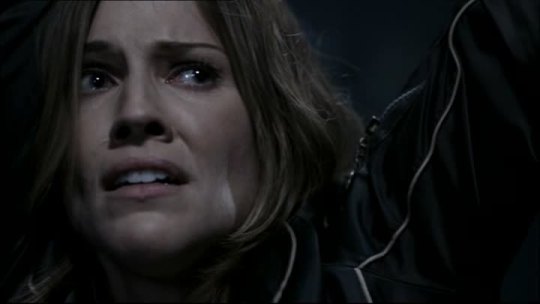
Memorable primarily because of the experimental (for SPN) narration which frames her as the duo’s partner when in fact she’s one of the things being hunted. For plot reasons spends her episode switching between being terrified, worried for her missing husband, and heartbroken. Can be somewhat tortuously argued to fit the theme of (not) overcoming grief and letting go, one of the few detectable threads in the directionless slog that’s season 2.
Status: Dead
Importance: Minor overall, major because she’s arguably the main character of her episode
On her own: Torture porny. Very torture porny.
Madison
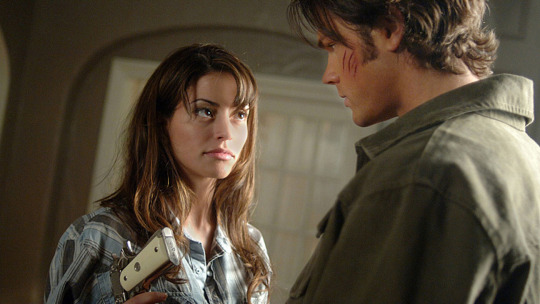
Intelligent, educated, and with an endearing love of soaps, she’s responsible for one of the three watchable sex scenes in the entire show. Has a nice theme of personal growth and healing from trauma going on, although it’s cut short and undermined when she’s revealed as a werewolf and euthanized by none other than Sam himself. Her death is filmed as a narrative-changing tragedy before it goes on to become a joke in season 4.
Status: Dead
Importance: Major
On her own: No matter how you look at it, she’s a diseased dog that needs to be put down for her own good while the menz wallow in their manly manpain. A rare example of a storyline I don’t think can be tweaked to be even marginally less awful.

I believe maestro may have wanted to portray sadness here.
Tamara
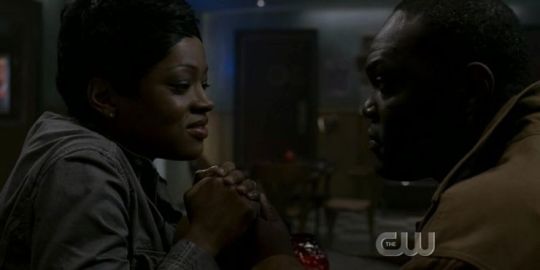
Told to be an excellent hunter, she’s shown as needing to be saved in order not to end up like her husband who’s literally forced to gargle bleach. Introduces the notion of growing hostility against the Winchesters in the hunting community. Full of wrath to fit the episode’s one-off seven deadly sins schtick, she’s emphasized as emotional and not in control of herself to such a degree that it overshadows how she’s in fact fairly competent in the second half of the episode.
Status: Alive as of s5
Importance: Minor
On her own: Wouldn’t stand out this much if she weren’t one of the few POCs in the blinding whiteness that’s SPN’s Americana.
Ruby

Doesn’t have the most organic introduction (A cool intriguing sexy French fries loving not like other gurls sassy badass, with a superdooper special knife? How 2000s cringe can you get?) but quickly becomes one of the show’s most distinctive villains allies. She’s an ally. Totally. Don’t worry about it. A sarcastic smartass jerk who breathes lies and manipulation, she’s resourceful, thinks on her feet, and throws herself into the thick of action without hesitation—a trait that gets especially interesting in retrospect as it suggests a fanatic devotion to her real goal. Sadly, her motivation doesn’t get fleshed out beyond “she really likes Satan, I guess” (which, hey) as the writers prioritize the surprise of the revelation over her further character development. Has the second watchable sex scene in the entire show; the fandom weeps itself to sleep. Gets killed by her own weapon when the writers decide that a character who’s smarter than both protagonists combined could well do with a bit of the good ol’ lobotomizing.
Status: Dead
Importance: Supermegadoublemajor
On her own: The stupid nature of her demise and occasional wooden acting do their best but never overshadow the awesome that’s Ruby.
Lisa Braeden

Dean’s past fling who becomes a living symbol of his desire for the white-picket fence. Is implied to possess mad financial skills as she owns property on a yoga teacher’s salary while a single mom below the age of 30. A blank slate the likes of Cassie, she’s salvaged by better acting. Frequent frowning suggests the presence of an inner life though it doesn’t tend to manifest itself on screen or affect the plot. Her single established trait—blow-out assertiveness the moment things get too far—is exercised mostly in service to her son. Exists solely to give Dean something to pine for.
Status: Alive as of s5
Importance: Major
On her own: A tertiary character who so-so sustains her own episode.
Bela Talbot

The best expansion of the show’s lore after the host of heaven, she’s unequivocally a bad person who nevertheless evokes huge amounts of sympathy. A cynical self-serving dealer in supernatural objects who mirrors Dean’s cracking tough guy persona, due to her abuse and the resulting trauma she refuses to open up and rely on anyone out of principle, or be indebted to them. Her pride makes her clinically unable to ask for help until it’s too late, and even forego mentioning personal history when it’d actively benefit her by softening the horrible impression others have of her. Switching between being an antagonist and the duo’s reluctant ally, she manages to outwit them roughly 90% of time. The fact that she has sexual tension with Dean while Sam lusts after her to the point of literal drooling sends fans apoplectic.
Status: Dead
Importance: Major
On her own: A complex character brought down by her own flaws.
Casey

A demon, she’s torn between wanting to enact the Apocalypse and just chilling with her soulmate. Definitely a fanfic reader because her idea of dealing with danger is to shut herself with her enemy in a room and have a lengthy theological debate. Very outspoken about humanity’s propensity for evil. Outcomplexes Lilith and to a lesser extent Ruby as she’s allowed to openly address her life philosophy. While the dialogue format of her scenes is designed to give Dean space to talk about his feelings regarding his impending demise, it’s more or less an equal push-pull exchange. She’s smart, captivating, capable, and in love, i.e. things SPN just isn’t interested in keeping around.
Status: Dead
Importance: Minor in the overall narrative, major in the episode and Dean’s development
On her own: Could have been so good if allowed to stick around
Gertrude Case

A rich elderly creep whose gropy ways are played for laughs because she’s a woman I guess. Either can’t read social cues or doesn’t give a fuck about people’s obvious discomfort. But don’t worry, it’s hilarious. She’s a woman, you see. What harm have those ever done.
Status: I’m going to assume dead by now, otherwise alive as of s5
Importance: A major figure in Sam’s life since she sexually assaulted him. Otherwise minor.
On her own: Sexual harassment is fun, kids
Lucy

Take Molly McNamara, strip her of any pretence at thematic relevance, minimize her importance while playing up her suffering, and then remove her like a broken Christmas decoration while making sassy remarks—voilà, you’ve ended up with the exact simplistic image that pops into one’s head when the words Supernatural and women are mentioned in a sentence.
Status: Dead
Importance: Non-existent
On her own: Just… why
Astaroth

Approaches awesomehood as her demonic business operation is built around preying on bored suburban hausfraus and taking their souls in exchange for magical powers, which they then use to secure benign materialistic keeping-up-with-the-joneses crap and devour one another like a bunch of assholes whose death you can’t help but eagerly anticipate. Srsly, eff those ladies. Stands out as the only (implied) lesbian in the Kripke arc.
Status: Dead
Importance: Minor, not even the real monster of the week when compared to the coven
On her own: There’s probably another discussion about Doylist sexism hidden around somewhere that I’m not really interested in having. Go Astaroth.
Nancy Fitzgerald
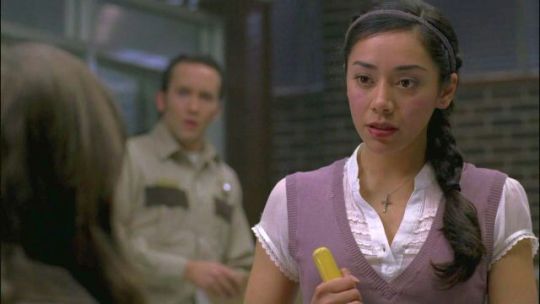
Sugar and spice and every other cliché about kindness combined in a pretty sweet package. Plot demands her to be a virgin for some reason, even though this aspect of her character doesn’t amount to anything in the story and only serves to contrast Nancy’s… purity with Ruby who we’re being constantly told is a “slut” and a “whore” and I have no idea how that’s supposed to work. Then again, Nancy’s virginity is framed as a valid personal choice in a rather empowering moment so that’s good. Has standards because even after deciding to let go of her chastity vow, she won’t settle for just any loser who happens to stand around converting oxygen into CO2. Her “cause manpain out of nowhere”-type death is one of the few of this category in the show which actually work because the cruel pointless nature of it is precisely the point (and at least she’s not the only one who doesn’t survive, please ignore how the episode literally says her demise is the most tragic because she never got laid, barfs).
Status: Dead
Importance: Minor
On their own: A textbook definition of a cinnamon
Lilith

An overarching menace that doesn’t spend too much time on screen, she’s a prop rather than her own person. This gets highlighted the moment the show stops casting her as a clichéd creepy child who likes to larp as that Twilight Zone kid, and turns her into the standard hawt chick in a will-they-won’t-they episode. No interiority as she goes along with a plan which requires her obliteration, without at least allowing her to explore her religious motivation. Ruby does all the heavy lifting in this partnership.
Status: Dead
Importance: Major
On her own: For the life of me I can’t make sense of her actions in s4. But the clichéd creepy kid is adorbs so points for memorability.
Maggie Zeddmore
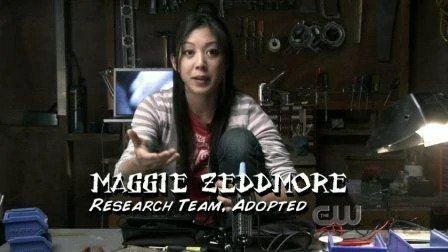
The straight man to the Ghostfacers’ utterly delightful douchefacery. Manages to keep up with Harry and Ed in terms of hilarity because not only is she exactly as out of place as them, she decides to role-play her childhood-friends-to-lovers fanfic in the middle of a haunted house as the best sister that she is.
Status: Alive as of s5
Importance: Minor
On her own: Love at first geek
Next, season 4 and 5 before I try to figure out what this all adds up to.
#spn#spn critical#supernatural#supernatural critical#sexist writing#tessa#jo harvelle#ellen harvelle#madison#ruby#bela talbot#lisa braeden#nancy fitzgerald#lilith
10 notes
·
View notes
Text
Highlights for Neoreaction a Basilisk
Angela Nagle’s appalling Kill All Normies, which takes the jaw-droppingly foolish methodology of simply reporting all of the alt-right’s self-justifications as self-evident truths so as to conclude that the real reason neo-nazis have been sweeping into power is because we’re too tolerant of trans people.
This brings us to our second relatively uninteresting question, which is what to do about the alt-right. In this case the answer is even easier and more obvious than the first: you smash their bases of power, with violent resistance if necessary. If you want a more general solution that also takes care of the factors that led to a bunch of idiot racists being emboldened in the first place you drag all the billionaires out of their houses and put their heads on spikes.
The lethal meme, known as Roko’s Basilisk, used the peculiarities of Yudkowskian thought to posit a future AI that would condemn to eternal torture everyone from the present who had ever imagined it if they subsequently failed to do whatever they could to bring about its existence.
I want to be clear, with all possible sincerity, that I love the braggadocio here. I want what he is selling. Yes, Mencius, savagely tear away the veil of lies with which I cope with the abject horror that is reality and reveal to me the awful, agonizing truth of being. Give me the red pill. The problem is, once we get our golf ball-sized reality distortion pill home, put on some Laibach, and settle in for an epic bout of Thanatosian psychedelia, we discover the unfortunate truth: we’re actually just huffing paint in an unhygienic gas station bathroom. Jesus, this isn’t even bat country.
By “crap,” of course, I do not mean “wrong.” Rather, I mean obvious, in the sense of sounding like the guy at the bar watching the news (probably Fox) and muttering about how “they’re all a bunch of crooks.” Liberal democracy a hopelessly inadequate and doomed system preserved by a system of continual indoctrination? You don’t say.
And this really is stunningly weird in the context of all his red pill rhetoric about the corrupt horrors of liberal democracy. Because while there are a great many obvious critiques of contemporary society, “there’s just not enough respect for profit” really doesn’t feel like one of them.
With this, we have a genuinely tricky moment, simply because of the sheer and unbridled number of unexamined assumptions going on here.
But all the same, if you’re going to talk about suppressed ideologies that oppose the interests of entrenched power, you’ve really got to talk about the original red pill: Marxism.
It is tempting to suggest that Moldbug is a failed Marxist in the sense that Jupiter is a failed star, its mass falling tantalizingly short of the tipping point whereby nuclear fusion begins. Over and over again, Moldbug asks questions much like those that Marx asked, and his answers begin with many of the same initial observations. But inevitably, a few steps in, he makes some ridiculously broad generalization or fails to consider some obvious alternative possibility, and the train of thought fizzles into characteristic idiocy.
This sort of “the world can be saved if only everyone listens to me” narcissism belongs in the genre of fiction, where it can accomplish something, and not in the visionary manifesto, where it only reveals its own impotence.
That is not to say they can get away with being wrong, at least not straightforwardly so, but it is to reiterate that the key problem with Moldbug, Yudkowsky, and Land is that they are in key regards uninteresting—that they offer dull and unsatisfying answers to their most compelling questions, of which “hang out with a bunch of racist nerdbros” is merely the worst.
Terence McKenna’s suggestion that DMT is an alien intelligence’s attempt to communicate directly with the human brain
That’s the whole point of the right to exit—a final and decisive rescue of individual liberty at all costs. But exiting requires that people stay behind; if we all go, we’ll just have to storm out again. The entire point of the project is to separate the wheat from the chaff.
He posits that in this situation the “absolute limit to our ability to adequately understand the world at all” becomes increasingly relevant, and observes that this is a frequent theme of both philosophy and horror.
The truth is that, despite Land’s evident fascination with them, the bulk of neoreactionaries are not people one would want to have a beer with, and there’s not a great case for reading their books either.
Yudkowsky isn’t just running from error; he’s running from the idea of authority. The real horror of the Basilisk is that the AI at the end of the universe is just another third grade teacher who doesn’t care if you understand the material, just if you apply the rote method being taught.
Hauntology comes from within us; the Weird from outside.
The red pill, pwnage, and for that matter the horror reading, monstrous offspring, and Satanic inversions all follow the same basic pattern—a sort of conceptual infiltration of someone’s thought in which their own methods and systems are used against them.
It is, after all, the great one-liner critique of Mencius Moldbug: he’s exactly what you’d expect to happen if you asked a software engineer to redesign political philosophy. And crucially, Moldbug basically agrees with it—he just also genuinely believes that the Silicon Valley “disruptor” crowd would be capable of running the world with no problems if only people would let them.
Which is to say, Satan opens by negging Eve, accusing her of looking at him “with disdain, Displeas’d that I approach thee thus, and gaze Insatiate, I thus single, nor have feard Thy awful brow,”112 which may be the earliest instance of telling someone they have resting bitch face.
In the face of an ecologically brutal planet, the guys with guns and tribal loyalties are a depressingly compelling bet to stick around.
With Moldbug the sense is overwhelmingly that empathy just never crossed his mind as something to factor into his design. He flat out didn’t think of it. Yudkowsky, on the other hand, thinks about it a lot and cares very deeply about it; he’s just incompetent at it.
The result of this approach is that Yudkowsky, without really meaning to, tends to look at everyone else in the world as inefficient Eliezer Yudkowskys instead of people as such.
Moldbug, Yudkowsky, and Land don’t just “do poorly” with empathy—they represent the most visible and explicit edge of a Cathedral-scaled system of values that casts the desire to listen and try to understand people who are different from you as anathema to reason itself.
This forces us to consider white culture as a set of perpetual ruins—as something that has always been lost, and that can only be apprehended as a tenuous and incomplete reconstruction.
No, what’s really notable here is Moldbug’s doe-eyed certainty that such a thing as an absolute truth service could be built; that there is a general plan of action so self-evidently compelling that if he only expressed it properly everyone would immediately flock to his side. In short, after thousands of words railing against the Cathedral for secretly being a religion, he’s accidentally reinvented religion. And then lost the holy text. You couldn’t parody it better.
They have that marvelous feature of the best gods: perfectly answering a question you didn’t know you had.
And a few, such as Ahania, are genuinely breathtaking in their scope: a pleasure goddess representing intellectual curiosity who is bound in a Persephone-like structure of death and rebirth is a metaphysical/literary construct to rival Milton’s Satan, and one Blake barely scratches the surface of.
And it’s hard not to suggest that the world would be a better place if Yudkowsky had stuck to children’s literature for adult geeks as opposed to starting a weird AI cult that derails efforts to curtail malaria.
And while Gamergate usually doesn’t have a product to sell in quite the same literal way, it’s worth noting how, for instance, two doors down from them is someone like Stefan Molyneux, whose output amounts to 30-60 minute PowerPoint presentations consisting of a by-now familiar sort of low-content dissembling, and whose business endgame is literally a cult.
The Gamergate narrative has always required a vast quasi-conspiracy to function, some story whereby feminists or SJWs or cultural Marxists exercise near-complete control over video games and video game journalism.
Not even a monoculture then—an anticulture, with Vivian James ironically its perfect representation. It’s a desire to befit their worldview, its adamance dwarfed only by its fundamental emptiness. There’s nothing there. There’s never been anything there.
And Gamergate as a whole is scarcely better. It’s always been notable for its near-complete lack of actual discussion of videogames.
More interesting is where his basic inclination towards racial stereotyping originates from: the material realities of New York real estate, its patterns of historical ethnic migrations geologically stratified across the city’s expansion.
He might have had a name. But then he literally built a six-hundred-and-sixty-six foot tower to which he offered up that name, sacrificing it upon its black altar such that the building became a titanic sigil of the sixteenth Major Arcana of the Tarot of the Golden Dawn, symbolizing destruction and ruin, with only the remnants of the man whose name it ate living within the rotting heart of its penthouse.
He sold his name, yes, but what did he get out of the deal? The answer, simply put, is what he would hereafter treat as his most valuable asset: his brand. In short, he became a creature of pure image.
But it also includes the raw allostatic load of living under his rule; the basic psychological wear and tear of waking up every morning in a post-fact world dominated by a bullying narcissist. The act of living in a world where the basic validity of your identity is contingent and perpetually imperiled, where the very definition of “fact” is in dispute, and where a brutish logic of dominance and humiliation pervades the entire social order.
Individuals can act all they want. They won’t make the end of the world go away, any more than their freedom to quit work can make them free to not starve
It helps that one can be against today’s racist wars—though not on the grounds of anti-racism, except of the most specious variety—while quietly accepting and utilising the racial inequities inherited from the racist imperialism of the past. As usual, reactionary thinking is dependant upon amnesia.
It admits that value is a mental construct, but one that is ‘real’ because it has a real social basis and real social effects. Value, for Marx, is neither a thing nor an essence, neither quality nor spirit. It is a social reality because of what humans actually do.
Theoretically detached from the objective and the material, and connected to business as a client, mainstream economics has become—to a large extent—an ideological discourse.
This is how Moldbug and Thiel’s view that democracy is incompatible with liberty arises. A democracy is a society in which the mass of the population—who are, by definition, mostly without property—can shape policy so that it curtails the freedom of the propertied to make their choices. In a free society—by their definition—the capitalists get to make their choices unfettered.
For the Austrians, democracy is to blame for capitalism going into crisis. Democracy breeds special claims by people who are not really concerned with making the choices that regulate the economy. The people without a big stake—the masses—thus destabilise the system.
This is the so-called Austrian ‘Business Cycle.’ Boiled right down: crashes and recessions happen because central banks set interest rates too low. Easy credit results, which screws up market signals. Loaners go crazy. Bubbles inflate and burst. Such lopsided production can only be remedied via letting interest rates rise to their ‘natural’ rate. In other words, the Austrian prescription is: let the crisis rip. It will be harsher but quicker. The only cure for god’s wrath is to wait for the plague to exhaust itself.
Opposition to democracy is entailed by the Austrian view of how capitalism works. Democracy is the rule of the ignorant and selfish public, and the state is their tyrannical arm. Moronic majoritarianism wields unjustifiable power over the propertied and the entrepreneurs who are, for Hayek for instance, almost promethean artists in their special sensitivity and understanding.
The logically consequent idea that emergency dictatorship may be necessary to preserve liberal society from democracy is in neoliberalism’s source code. Neoliberalism, contrary to myth, is an authoritarian ideology, committed to defending property and wealth by violence both physical and structural.
The leaders of Rothbard’s revolution would be the libertarians and the minarchists. The troops would be the masses, spurred to fight the elites. And the spurring would take the form of appeals to racism.
The disproportionate number of former-libertarians in American fascism is revealing because conservatives are far more numerous in America than libertarians, which suggests that libertarianism is statistically over-represented.
The Cultural Marxism conspiracy theory now espoused across the alt-right is a reiteration of what the (actual) Nazis called kulturbolschewismus, an idea central to Nazi dogma, about degenerate art and culture being manufactured by Jewish communists to undermine the unity of the German people. The resurrection and repackaging of this idea across a movement soaked in libertarianism is not surprising, because antagonism to socialism goes right back to the dawn of libertarianism, to the Austrian School’s foundational and self-chosen role as the intellectual foe of Marx.
People might not necessarily formulate their objections to the content of newspapers that way, but they’re nevertheless absenting themselves from daily exposure to one of the main means by which the ruling class produce ideology and public consent. This is at least as big a concern to the people running the media as the need to claw back profits.
In all of these cases, the strategy is to play on insecurities of young men in an age where there are mounting ideological challenges out there—especially on the Internet—to their untroubled social privilege. Coupled with the twin legacies of decades of neoliberalism—increasing ideological and political disorientation, and a future far less secure than that which faced their parents and grandparents at their age—such challenges can terrify the semi-privileged layer of young, white, middle class men, who enjoy all those privileges without also enjoying actual material security.
Reactionary politics once again takes advantage of having a wide batrachian mouth, both sides of which may be used for talking.
The reason actions don’t lead inevitably to goals isn’t because there are complex material structures of oppression that heavily shape people’s lives, but because we exist in linear time. Not only does Rothbard not connect time to what dominates it for most people in capitalist society—work—but hilariously, he doesn’t even bother connecting time to its ultimate horror and constraint, death.
To quote the monster directly: “Milton produced Paradise Lost in the way that a silkworm produces silk, as the expression of his own nature.” Marx would like all labour to be like that, and sees no fundamental reason why it shouldn’t.
It’s pretty clear that the Austrian School doesn’t even remotely care about this fact, but it doesn’t inherently contradict anything they say. But that is, in the end, the point, and one I’ve made before: they don’t care. That’s clear, in a sense, all the way back in the basic axiom, with its active foregrounding of the heroic individual acting upon the world, as opposed to the state of affairs that most actual people experience, which is mostly being buffeted around by various external forces, whether they be governments, history, or the class system. Indeed, “individual human beings are acted upon” would be every bit as justifiable an axiom as “individual human beings act,” if not moreso.
They have been hugging Marxism on the brink of the Reichenbach Falls for a century and a half, staring into its eyes, but have never really seen it.
Mises’ only invocation of courage is in the context of statesmen standing up to labor unions. Decency only comes up in the context of “laws of morality and decency.” And his sole mention of kindness is a complete and grotesque misunderstanding of the very concept as he declares that “the indigent has no claim to the kindness shown to him,” as if being unearned isn’t the entire fucking point of kindness. It is a conception of human action without a shred of concern for empathy – human action devoid of all humanity.
But the real reason for this is that, more than anyone else, Marx provided an alternative to the charade on which their entire philosophical edifice was constructed. He showed the need for the destruction of that which, to them, gives the world meaning—and a method by which it might be achieved.
Given that no small number of conspiracy theories are, in point of fact, anti-Semitic, any attempt to uncritically synthesize them will be as well.
Icke’s theory is much the same way. We know wealthy elites control our minds. Knowing they’re lizards (or, for that matter, Jews) doesn’t actually change anything. It is, to borrow a phrase, malignantly useless knowledge.
Not only does nothing follow from Icke’s conclusions, nothing follows within the argument itself. Icke does not so much lay out a case for the lizard people as blunder among vague associations, hoping that the aggregate of a bunch of extremely tenuous connections will somehow be persuasive instead of a discombobulated mess of shoddy research and sloppy reasoning.
The history of the world consists of a lot of wealthy assholes sleeping with each other and killing people. Changing up which assholes slept with and killed who doesn’t actually make much of a difference.
Ridiculous arguments, especially ones that recognize their absurdity, are capable of revealing things that do not follow obviously, if at all, from self-consciously serious approaches, but that are nevertheless true and valuable realizations.
So is his inclination to be skeptical of the “official” version of history. The value of this, to be clear, is not simply skepticism for its own sake (an approach that is just as likely to lead to things like climate change denial or creationism as it is to some productive insight), but rather the realization that, as the saying goes, history is written by the victors, and the standard version of history is inevitably the one that most flatters those in power.
It is not entirely clear why monstrous truth must take reptilian form, but just as the weird turns instinctively to tentacles and the hauntological inevitably drifts towards skulls, for some reason awful truth must take the form of a reptile, whether a petrifying basilisk or just a bunch of pan-dimensional aliens.
This is a leftist book, and so must engage in a circular firing squad at least once.
This set a pattern whereby trans rights were repeatedly employed by the gay rights movement as a bargaining chip—as the thing they were pointedly willing to sell out in the name of compromise, as they spectacularly did when lobbying for the Employment Non-Discrimination Act, which excluded trans people in every version that was brought to Congress prior to 2009.
Thiel’s vision of corporate success is blatantly just the Moldbug/Land vision of how authoritarian capitalism will save us from the Great Filter.
Rather, it’s that once you’re willing to question the basic fact of Thiel’s competence it rapidly becomes apparent that the only actual evidence for this competence is that he has a lot of money.
And his fascination with seasteading numbers him among the litany of people interested in micronations, which is such a rich vein of complete crackpottery that I’d hate to deprive you of the pleasure of Googling it. This borders on the investment portfolio you’d get if you gave David Icke several billion dollars.
Who would craft such a thing as the alt-right? Only a fucking idiot. What other answer were we possibly going to find? It’s been idiots all the way down. And so of course even its billionaire supervillains bankrolling world-conquering AIs, vampiric life extension, and Donald Trump are idiots. This borders on “A is A.” And yet for all its obviousness, it captures what is perhaps the key realization about the alt-right—one that’s been implicit through much of this book, but is worth making explicit as we come to a close: they’re stupid.
I do not suggest this to diminish their horror. Far from it: the essential horror of the abyss is stupidity. That’s why it’s an abyss. The unique and exquisite danger of stupidity is that by its nature, it is beyond reason. There is nothing that can be said to it, because by definition it wouldn’t understand. It is an ur-basilisk—the one terrifying possibility that haunts every single argument that has ever been made. It is a move without response, playing by no rules other than its own, which do not generally include any obligation towards consistency. It is, in its way, the only approach that can never lose an argument. And in the alt-right and its affiliates we have one of the most staggeringly vast nexuses of raw stupidity the world has ever crafted.
The post Highlights for Neoreaction a Basilisk appeared first on alper.nl.
via English – alper.nl https://ift.tt/2LPiKQ2
0 notes